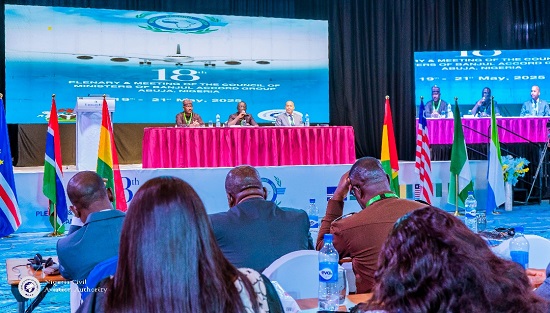
The high cost of travel across West African nations continues to hinder intra-African connectivity, despite the enormous potential of increased air access. The meeting stressed that actualising MASA will open regional skies, stimulate aviation growth, boost traffic, and support jobs and economic activity.
BY ANTHONY OMOH
The Gambia has challenged the Banjul Accord Group (BAG) member states to fully implement Multilateral Air Services Agreement (MASA), stressing its urgent necessity in promoting regional aviation integration.
This call was made during the 18th Plenary and Council of Ministers meeting of the BAG, which was held in Abuja, Nigeria. Director General Civil Aviation, Captain Chris Najomo, and Director General Gambia Civil Aviation Authority, Mr. Fansu Bojang, served as co-chairs of the Plenary and Council of Ministers meeting.
The high cost of travel across West African nations continues to hinder intra-African connectivity, despite the enormous potential of increased air access. The meeting stressed that actualising MASA will open regional skies, stimulate aviation growth, boost traffic, and support jobs and economic activity.
Deputy Director General Gambia Civil Aviation Authority, Mr. Sulayman Jatta, while speaking at the meeting, highlighted these challenges and their implications. He said, “Considering the high cost of travel between countries which is seriously curtailing the enormous potential of improved air access, domesticating air services between the states will open up our skies and promote the value of aviation, boost traffic, drive economic development and create jobs in the BAG subregion.”
He also reviewed the current status of airline operations and the granting of fifth freedom rights among BAG member states. Despite lacking a home-based carrier, Banjul International Airport has witnessed strong post-COVID recovery and continues on an upward growth trajectory.
Currently, The Gambia does not have any active Air Operator Certificate (AOC) holder. However, two applications are underway. SU Airlines is nearing final certification, while the Air Gambia application is at the pre-assessment stage.
Jatta stated that the civil aircraft register includes 16 aircraft. These range from Boeing 737s and 777s to Embraer 135s. The Gambia also has seven Approved Maintenance Organizations currently listed in its aviation register.
He disclosed that Overland Airways had received an Air Service License to commence scheduled services between Banjul and Lagos, with stops in Freetown. These operations will run three times weekly. According to him, “This decision aligns with efforts under the Single African Air Transport Market (SAATM) to promote regional connectivity.”
Additionally, ValueJet has been granted traffic rights to operate services between Nigeria and The Gambia. These approvals reflect ongoing strategies to open up West African skies and reduce barriers to intra-African air travel.
To further encourage air travel demand, The Gambia is revisiting its ticket pricing structures. “Charges on air tickets which will greatly lower the cost of travel, thereby potentially stimulating air travel demand. IATA has been duly notified,” the report added.
On navigation services, The Gambia has commenced the process of joining ASECNA. Currently, ASECNA provides upper airspace management over the country and handles services within 20 nautical miles of Banjul International Airport, vertically up to 5,500 feet.
Jatta said The Gambia has decided to transfer full air navigation services to ASECNA. A formal application was submitted through diplomatic channels, with Senegal supporting the move. “ASECNA has fielded two technical missions to Banjul to evaluate the State’s ANS and the overall aviation system. The Director General and Chairperson of the Board also visited. The preliminary reports are encouraging, and we are hopeful of admission by the end of this year,” he added.
In terms of aviation safety oversight, The Gambia has maintained a robust system. The last ICAO USOAP-CMA audit was in 2018, achieving an effective implementation score of 73.87 percent. Though slightly below the Global Aviation Safety Plan (GASP) benchmark of 75 percent, authorities are implementing a corrective action plan.
The Gambia has also made commendable progress in SAATM implementation. Since signing the Solemn Commitment on May 5, 2018, notable strides have been made. The African Civil Aviation Commission (AFCAC) has conducted audits based on Key Performance Indicators approved by the African Union Commission.
The findings from the AFCAC audit show The Gambia’s dedication to a liberal air transport regime and integration within Africa. With these reforms and infrastructure efforts, the country is pushing other BAG members to also implement Multilateral Air Services Agreement.
This shared commitment is expected to remove access bottlenecks, reduce travel costs, and unlock new opportunities for trade, investment, and aviation growth across the BAG subregion.























